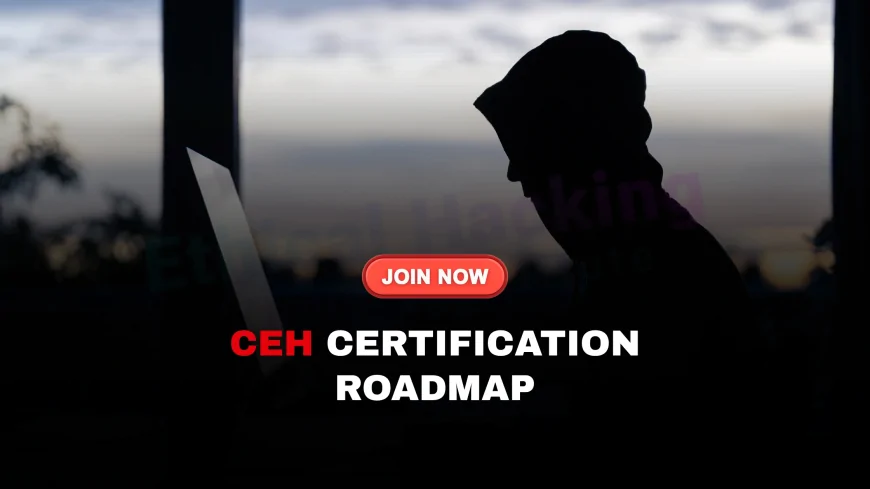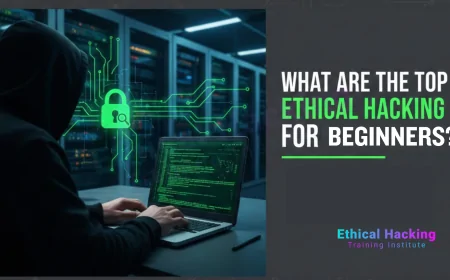How to Get Your CEH Certification: A Roadmap for Success | Master the CEH Exam: A Clear Roadmap to Certification
Discover the step-by-step roadmap to earning your CEH certification. Learn about training, prerequisites, exam prep, and career growth in ethical hacking.

Table of Contents
- Introduction
- Why Pursue CEH Certification?
- Eligibility & Prerequisites
- Training Options Overview
- Curriculum Deep Dive
- Suggested Study Timeline
- Hands-on Practice & Labs
- Exam Preparation Strategies
- Exam Day Tips
- Post-Certification Steps
- Career Paths After CEH
- Maintaining & Renewing Your CEH
- Top CEH Resources
- Common Pitfalls & How to Avoid Them
- FAQs
- Conclusion
Introduction
Securing the Certified Ethical Hacker (CEH) certification is a significant milestone in a cybersecurity professional’s journey. This roadmap guides you through each phase—from eligibility verification and training selection to exam strategies and career advancement. Designed for beginners and intermediate learners, this guide ensures a confident path to becoming a certified ethical hacker.
Why Pursue CEH Certification?
- Global recognition: CEH is a globally acknowledged credential trusted by industries including finance, healthcare, and government.
- Skill validation: Demonstrates expertise with tools like Nmap, Metasploit, Wireshark, and Burp Suite.
- Higher salary potential: Professionals with certifications like CEH typically earn 15–25% more than their non-certified counterparts.
- Career progression: Offers pathways into roles such as penetration tester, SOC analyst, and security consultant.
Eligibility & Prerequisites
Qualification for the CEH exam requires you to meet at least one of the following prerequisites:
- Complete official EC‑Council training through accredited providers, or
- Have **2+ years of professional cybersecurity experience** and receive approval via an eligibility process.
It’s recommended that learners have foundational skills in TCP/IP, network architecture, and OS platforms.
Training Options Overview
- Instructor-led (iClass/ATC): Interactive, labs included.
- Live-online training: Structured virtual classes with labs.
- Self-paced e-learning: On-demand modules + optional virtual labs.
- Bootcamps: Intensive weekend or multi-day formats.
- Hybrid programs: Combine self-study and instructor-led lab sessions.
Curriculum Deep Dive
CEH covers 20 modules, including:
- Reconnaissance & Scanning
- System Hacking
- Web Application Security
- Malware Threats & Sniffing
- Social Engineering & Evasion
- Wireless, Cloud/IoT Hacking
- Cryptography & Report Writing
The CEH v13 update also integrates MITRE ATT&CK, IoT/OT modules, and CTF components.
Suggested Study Timeline
A recommended 6-month part-time study plan:
- Months 1–2: Fundamentals—Network, Linux, basic scripting
- Months 3–4: Core CEH modules + daily lab practice
- Month 5: Mock exams and review weak areas
- Month 6: Final phase—revise key topics, simulate the real test environment, and study the exam outline closely.
Hands-on Practice & Labs
- iLabs: EC‑Council’s official cloud hands-on lab environment.
- TryHackMe, Hack The Box: Practical community labs and CTF exercises.
- Self-built home labs: Build a personal ethical hacking lab with Kali Linux and test environments such as DVWA and Metasploitable.
- CTF competitions: Real-world scenarios and timed challenges bolster problem-solving skills.
Exam Preparation Strategies
- Create weekly milestones aligned with CEH learning objectives.
- Practice MCQs using official question banks and online mock tests.
- Review lab logs and tool outputs to reinforce memory.
- Boost your preparation by joining interactive forums and active study communities.
- Take full-length practice tests under timed settings to prepare for the CEH exam stress.
Exam Day Tips
- Arrive early for in-person exams or test your system for remote testing.
- Read each question carefully and flag uncertain answers.
- Manage time—approximately 1.8 minutes per question.
- Review flagged questions before submission if time allows.
Post-Certification Steps
- Earn **120 EC‑Council ECE credits** over 3 years for renewal.
- Attempt the **CEH Practical** to earn CEH Master designation.
- Build a professional portfolio: lab notes, write-ups, CTF submissions.
- Join pen-test projects, open-source security, bug bounties, and CTFs.
Career Paths After CEH
- Penetration Tester
- SOC Analyst
- Security Consultant
- Red Team Operator
- Bug Bounty Hacker
Maintaining & Renewing Your CEH
CEH remains valid for 3 years. To renew:
- Accumulate **120 ECE credits** via: webinars, training, writing, volunteering.
- Submit proof and pay renewal fees on EC‑Council’s portal.
Top CEH Resources
- Official EC‑Council courseware and iLabs
- EC‑Council certification handbook and exam blueprint
- YouTube tutorials: HackerSploit, The Cyber Mentor
- Practice labs: TryHackMe, Hack The Box, VirtualBox
- Study communities: Reddit (r/CEH), Discord, LinkedIn groups
Common Pitfalls & How to Avoid Them
- Relying too much on dumps—use them for practice, not primary knowledge.
- Skipping labs—practice is essential for real skill development.
- Poor time management during study and exam.
- Neglecting report-writing, a crucial professional skill.
FAQs -
1. What is the CEH certification?
The Certified Ethical Hacker (CEH) is a credential offered by EC-Council that validates skills in ethical hacking, penetration testing, and cybersecurity threat analysis.
2. Who is eligible to take the CEH exam?
Anyone who has completed official EC-Council training or has two years of verified cybersecurity work experience is eligible to attempt the CEH exam.
3. What is the format of the CEH exam?
The CEH exam consists of 125 multiple-choice questions to be completed in 4 hours. It tests practical knowledge of hacking tools, techniques, and methodologies.
4. How much does it cost to get CEH certified?
The cost varies depending on your location and training provider. On average, it ranges from $1,000 to $2,500 including training, labs, and the exam voucher.
5. How long should I study for the CEH exam?
On average, 3 to 6 months of consistent part-time study is recommended. This includes both theoretical learning and hands-on practice with hacking tools.
6. Can I pass CEH with self-study?
Yes, you can pass with self-study if you have a strong background in networking, cybersecurity, and access to practical labs like TryHackMe or iLabs.
7. Is hands-on lab experience necessary for CEH?
Yes, hands-on practice is critical to mastering real-world ethical hacking tools and scenarios. It also helps when attempting the CEH Practical (CEH Master).
8. What topics are covered in the CEH exam?
Topics include footprinting, scanning, enumeration, system hacking, malware, sniffing, social engineering, web app hacking, wireless networks, cryptography, and cloud security.
9. What’s the difference between CEH and CEH Practical?
CEH is a theory-based exam, while CEH Practical involves solving real-world challenges in a live hacking lab environment. Earning both grants the CEH Master title.
10. Do I need to know programming for CEH?
While not mandatory, basic knowledge of scripting (Bash, Python, PowerShell) is helpful for understanding automated attacks and custom tool usage.
11. What study materials are recommended for CEH?
Recommended resources include official EC-Council courseware, iLabs, CEH exam guide, practice tests, TryHackMe, YouTube tutorials, and cybersecurity books.
12. What is the passing score for the CEH exam?
The passing score ranges between 60% and 85%, depending on the difficulty of the exam version you receive (adaptive scoring).
13. Is CEH certification worth it?
Yes, CEH is globally recognized and highly respected in cybersecurity. It helps land roles like penetration tester, SOC analyst, and ethical hacker.
14. Can I take the CEH exam online?
Yes, EC-Council offers remote proctoring via ECC Exam Center. You must meet technical and environment requirements before scheduling.
15. How long is the CEH certification valid?
The CEH certification is valid for 3 years. You must earn 120 ECE credits within that period to renew it.
16. What are ECE credits?
ECE stands for EC-Council Continuing Education. You earn credits by attending webinars, taking new courses, writing blogs, or speaking at events.
17. What is the CEH Master certification?
CEH Master is awarded to professionals who pass both the CEH (theory) and CEH Practical (hands-on lab) exams. It reflects advanced hacking proficiency.
18. What job roles can I get after CEH?
Common roles include ethical hacker, penetration tester, cybersecurity analyst, SOC analyst, red teamer, and information security consultant.
19. Can CEH help with bug bounty hunting?
Yes, CEH equips you with the skills needed for vulnerability assessment, reconnaissance, and exploitation—key components of successful bug bounty hunting.
20. How do I renew my CEH certification?
You can renew your CEH by earning 120 ECE credits within 3 years and submitting them through your EC-Council Aspen portal, along with the renewal fee.
Conclusion
Obtaining the CEH certification requires dedicated planning, consistent study, and hands-on practice. By following this roadmap—covering eligibility, training, lab practice, exam prep, and post-certification steps—you’ll be well-positioned for success. The CEH credential can be a transformative milestone in your cybersecurity journey, opening doors to advanced roles and enhancing your ethical hacking expertise.
What's Your Reaction?
 Like
0
Like
0
 Dislike
0
Dislike
0
 Love
0
Love
0
 Funny
0
Funny
0
 Angry
0
Angry
0
 Sad
0
Sad
0
 Wow
0
Wow
0















